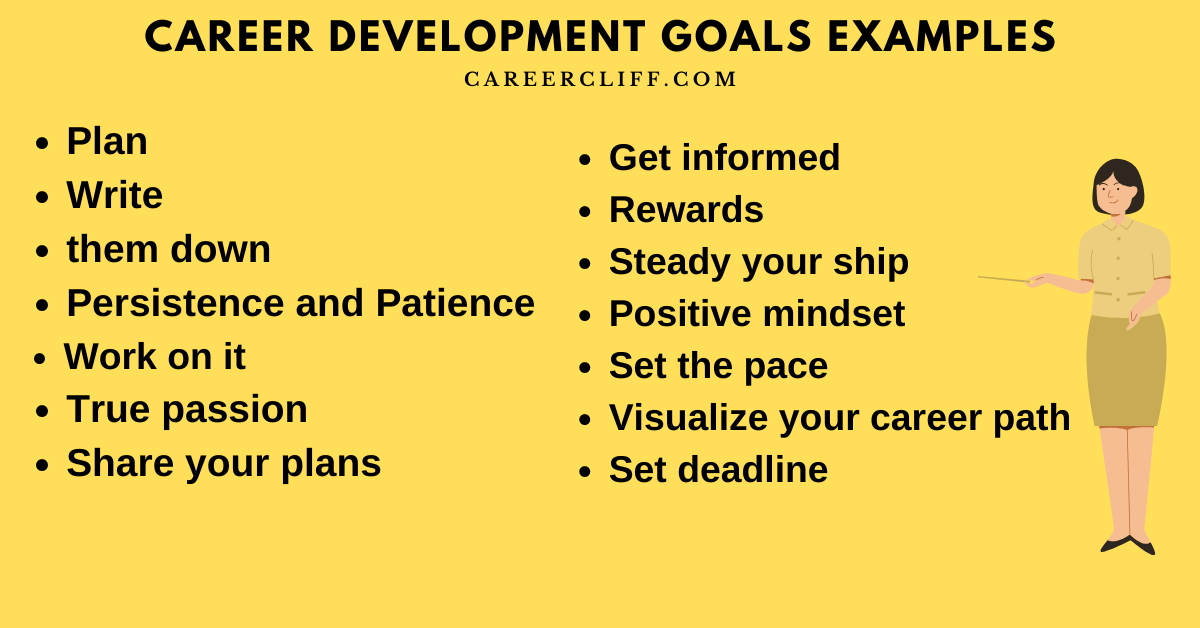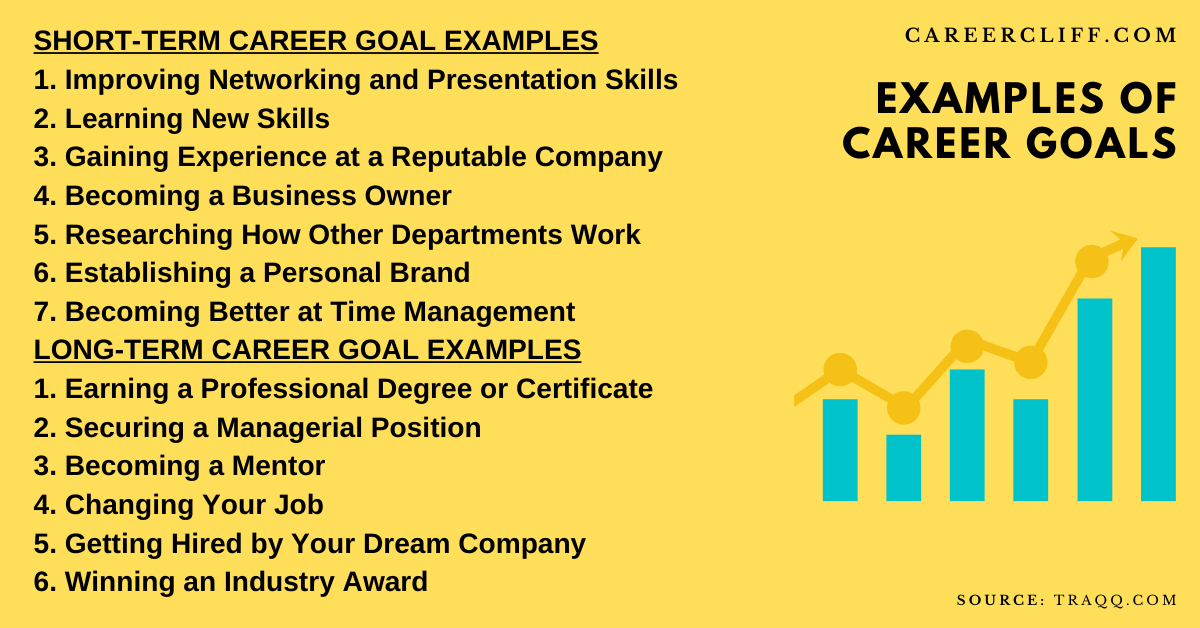Career Development Goals are like the GPS to your dream job, guiding you through the twists and turns of professional growth with clarity and purpose. As we navigate the landscape of career aspirations, setting concrete goals becomes the compass that leads us towards success. Let’s dive into the world of Career Development Goals and unlock the keys to a fulfilling career journey.
Importance of Career Development Goals
Setting clear career development goals is crucial for professional growth as it provides individuals with a roadmap to success. By outlining specific objectives and milestones, individuals can track their progress, identify areas for improvement, and ultimately advance in their careers.
Benefits of Having Well-Defined Career Development Goals
- Clarity and Focus: Clear goals help individuals stay focused on what they want to achieve in their careers, reducing distractions and enhancing productivity.
- Professional Growth: Setting goals allows individuals to push themselves out of their comfort zones, acquire new skills, and grow professionally.
- Increased Motivation: Having a clear vision of where they want to be motivates individuals to work harder, overcome challenges, and stay committed to their career path.
- Personal Satisfaction: Achieving career development goals brings a sense of accomplishment and fulfillment, boosting confidence and self-esteem.
How Career Development Goals Help Individuals Stay Motivated and Focused
- Accountability: Goals create a sense of accountability as individuals are responsible for their own progress and success.
- Measurable Progress: Setting measurable goals allows individuals to track their progress, celebrate achievements, and adjust strategies if needed.
- Career Advancement: Clear career development goals pave the way for advancement opportunities, promotions, and increased responsibilities within an organization.
- Adaptability: Goals help individuals adapt to changes in the industry, stay relevant, and continuously evolve in their careers.
Types of Career Development Goals

When it comes to career development goals, there are various types that individuals can set to advance in their professional journey. These goals can range from short-term objectives to long-term aspirations, focusing on both skill enhancement and career advancement.
Short-term and Long-term Career Development Goals
Short-term career development goals are those that can be achieved within a relatively short period, usually within a year or less. These goals are essential for immediate progress and can include tasks like completing a certification course, improving a specific skill, or networking with professionals in the field. On the other hand, long-term career development goals are broader objectives that may take several years to accomplish.
Examples of long-term goals can be reaching a certain position, starting a business, or becoming an industry expert.
Skill-based Goals and Position-based Goals
Skill-based career development goals focus on improving specific abilities or acquiring new skills that are relevant to one’s profession. For example, a skill-based goal could be to enhance communication skills, learn a new programming language, or become proficient in project management. Position-based goals, on the other hand, are centered around advancing to a particular role or level within an organization.
This could involve aiming for a promotion, transitioning to a leadership position, or moving into a different department.
Personal Development Goals Complementing Professional Career Goals
Personal development goals play a crucial role in complementing professional career goals by enhancing an individual’s overall growth and well-being. These goals focus on aspects such as self-improvement, work-life balance, mental health, and emotional intelligence. By setting personal development goals like maintaining a healthy lifestyle, practicing mindfulness, or improving time management skills, individuals can create a solid foundation for achieving their professional ambitions and sustaining long-term success in their careers.
Strategies for Setting Career Development Goals

Setting effective career development goals is crucial for personal growth and professional success. Here are some strategies to help you align your goals with your values and interests, use the SMART criteria, and break down larger goals into manageable tasks.
Aligning Career Development Goals with Personal Values and Interests
It’s essential to reflect on what truly matters to you and what you are passionate about when setting career goals. Consider your values, interests, and long-term aspirations to ensure that your goals are meaningful and fulfilling.
- Reflect on your passions and what makes you feel fulfilled in your work.
- Consider how your values align with different career paths and opportunities.
- Seek feedback from mentors or career counselors to gain insight into your strengths and interests.
Using the SMART Criteria for Setting Effective Career Development Goals
The SMART criteria provide a framework for setting goals that are specific, measurable, achievable, relevant, and time-bound. This approach helps you create goals that are clear, focused, and actionable.
- Specific: Clearly define what you want to achieve in your career.
- Measurable: Establish criteria to track your progress and success.
- Achievable: Set realistic goals that are within your reach.
- Relevant: Ensure that your goals align with your long-term objectives and aspirations.
- Time-Bound: Set deadlines to keep yourself accountable and motivated.
Breaking Down Larger Career Goals into Manageable Tasks
Breaking down larger career goals into smaller, manageable tasks can help you stay focused, motivated, and on track to achieve your objectives. By taking incremental steps, you can make progress towards your larger goals more effectively.
- Identify the key milestones that will lead to the achievement of your larger goal.
- Create a timeline with deadlines for each task to keep yourself organized.
- Celebrate small victories along the way to stay motivated and inspired.
Tracking and Achieving Career Development Goals
Setting career development goals is essential, but monitoring and evaluating progress towards those goals is equally important for success. By tracking your achievements, you can stay motivated, make necessary adjustments, and ultimately reach your desired career milestones.
Importance of Tracking Progress
Tracking progress towards your career development goals allows you to stay focused and accountable. It helps you measure how far you have come and what still needs to be done. By monitoring your achievements, you can identify areas of improvement and take proactive steps to reach your objectives.
- Use a journal or planner to record daily or weekly progress.
- Set specific milestones and deadlines to track your advancement.
- Regularly assess your progress and make adjustments as needed.
Tools and Techniques for Monitoring
There are various tools and techniques available to help you monitor and evaluate the achievement of your career goals. Utilizing technology, seeking feedback from mentors, and self-assessment are effective ways to track your progress.
Online goal-tracking apps can provide visual representations of your progress and help you stay on track.
- Regularly review your goals and make sure they align with your long-term career vision.
- Schedule check-ins with a mentor or career coach to receive feedback and guidance.
- Conduct self-assessments to evaluate your skills and competencies in relation to your goals.
Celebrating Milestones and Accomplishments, Career Development Goals
Celebrating milestones and accomplishments along the way is crucial for maintaining motivation and momentum towards your career development goals. Recognizing your achievements boosts confidence and reinforces your dedication to reaching your aspirations.
- Share your successes with friends, family, or colleagues to celebrate your progress.
- Reward yourself for achieving milestones, whether big or small, to stay motivated.
- Reflect on how far you have come and acknowledge the hard work you have put in to reach your goals.
